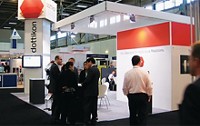Advertisement
Grab your lab coat. Let's get started
Welcome!
Welcome!
Create an account below to get 6 C&EN articles per month, receive newsletters and more - all free.
It seems this is your first time logging in online. Please enter the following information to continue.
As an ACS member you automatically get access to this site. All we need is few more details to create your reading experience.
Not you? Sign in with a different account.
Not you? Sign in with a different account.
ERROR 1
ERROR 1
ERROR 2
ERROR 2
ERROR 2
ERROR 2
ERROR 2
Password and Confirm password must match.
If you have an ACS member number, please enter it here so we can link this account to your membership. (optional)
ERROR 2
ACS values your privacy. By submitting your information, you are gaining access to C&EN and subscribing to our weekly newsletter. We use the information you provide to make your reading experience better, and we will never sell your data to third party members.
Business
Pharma Sector Ponders Recession
Contract manufacturers at CPhI see constraints and opportunities in a difficult market
by Rick Mullin and Lisa M. Jarvis
October 20, 2008
| A version of this story appeared in
Volume 86, Issue 42

FINE CHEMICALS manufacturers arrived at CPhI—the conference on pharmaceutical ingredients—in Frankfurt earlier this month just as the meltdown in U.S. financial markets began spreading to Europe and Asia. The impact of a global economic downturn on the pharmaceutical and biotech industries was a pervasive topic of discussion. It added a new level of uncertainty to the perennially uncertain business of supplying active pharmaceutical ingredients (APIs) and intermediates to drugmakers.
Most attendees agreed that although the pharmaceutical industry may be more recession proof than others—people will always get sick and major drug companies have plenty of money—the lack of credit may curtail drug development at start-up and small biotech firms that rely on venture capital. Large drug companies, in turn, risk being deprived of a vital source of new products.
Attendees also noted that the pharmaceutical industry is entering the new economic era with its own persistent problem of a nonproductive new product pipeline. On the upside, financial pressure is viewed as further incentive for large drug companies to pursue efficiency improvements that in recent years have favored increased outsourcing of API manufacturing.
"It's too early to say what the impact of an economic downturn will be on the pharmaceutical sector," said R. Ananthanarayanan, president of the NPIL Pharma division of Piramal Healthcare. "Overall, the pressure on the pipelines is not letting up. If you look at Phase III pipelines, the impact is very light."
Ananthanarayanan sees a Catch-22: Small innovators may be able to circumvent the tightening private equity financing market by striking deals with large drug firms, but they will be unable to advance products to the point of making such deals without up-front private investment. This situation may ultimately cut big pharma off from innovative drugs, he said.
"Most of the big pharma companies are now dependent on the small companies' R&D rather than their own," he said. "If there is an economic crisis that actually pushes some of the funding away from these virtual companies, that could be a further drag on the efforts to advance new product pipelines."
Ananthanarayanan noted that the credit crisis comes at a time when the contract manufacturing sector is enjoying a distinct shift toward increased outsourcing on the part of major drug companies. "There is no denying that an economic downturn is coming at a bad time for the industry," he said.
Still, suppliers throughout the exhibit hall agreed that, with cost pressures acute, outsourcing has become a critical component of big pharma's business and that outsourcing decisions are being made at a higher level within drug firms.
"It's too early to say what the impact of an economic downturn will be on the pharmaceutical sector."
IN THE PAST, big pharma would outsource the lower quality, lower priority chemical manufacturing projects and allow a middle manager to decide the winner of the contract, explained Timothy C. Tyson, chief executive officer of the pharmaceutical services firm Aptuit. "Now, it's something that's talked about in the boardroom," said Tyson, who spent more than a decade working in big pharma. "More senior people are getting involved, which means it's much more strategic."
Drug companies also appear to be getting comfortable with contractors that serve both innovator and generic markets. Historically, many contract manufacturers avoided producing APIs for generic drugs to allay their big pharma customers' fears about confidentiality and competition. In the past few years, the lines between innovator and copycat have blurred, with big pharma making a foray into generics and some generic companies developing or buying innovative niche products.
"Two years ago, when I went into an innovator company and said I supplied generics, they would say, 'You are our archenemy,' " said Peter Seufer-Wasserthal, vice president and general manager of pharma services at Codexis. "Now, for the people who write the checks, this attitude is gone."
Hesitancy on the part of contract firms to deal in generics was pervasive as recently as five years ago, agreed Dennis P. Bauer, senior vice president of sales and marketing at Swiss contractor Siegfried. But big pharma is looking everywhere to slash costs, and suppliers with the ability to develop money-saving synthetic routes—a trademark of generics manufacturing—have become more attractive. "Before, time-to-market was key," Bauer said. "Now, customers are saying they know they're in for competition down the road, and they are asking what we can do to help."
COST CONTAINMENT through process efficiency has become a hallmark of contracts with large pharmaceutical companies, according to Aslam Malik, president of Ampac Fine Chemicals. "Pharma companies are consolidating production, outsourcing has increased, and in our view, partnering is going way up," he said. Drug companies are now viewing their chemical suppliers as part of their own supply chains, Malik said. "It has gone from 'How can you cut your prices?' to 'How can you make your operations more efficient?' We have always pushed operational excellence, but now customers are interested in helping us lower our overall costs."
That kind of assistance requires long-term contracts, according to Malik. "Continuous improvement doesn't help if we are only working on a project for six months," he said. "We are asking for visibility down the road, and we are seeing a new openness on the part of pharma companies to long-term commitments." Customers have gone so far as to offer Ampac employees seminars on quality programs such as Six Sigma, Malik said. "They will teach us how to catch fish. But they want to get some of that savings back."
The economic downturn will only accelerate the drug industry's push for efficiency, Malik figures. "It breeds innovation and opens minds. For example, we have a lot of processes where we want to recycle solvents. Our customers have traditionally said no, but they are now receptive to the idea. If we can provide the data to support doing it, they will allow us."
Malik cautioned that it is not possible to bring API manufacturing wholly in-line with the efficiency programs employed in the automotive, computer, and other industries. "Failure to deliver on time is the kiss of death in this industry," he says. "Just-in-time delivery strategies can cut into assurance of supply."
Although small venture-funded drug firms are already stepping on the brake, David J. Ager, principal scientist at DSM, said opportunities are opening for partnerships with large firms that are consolidating their manufacturing base. "That capacity seems to be irretrievable once you close a plant. We see this and we like it," he said.
But the kind of contracts that will emerge as large drug companies scale back their own production will vary by firm, according to Ager. "With one pharmaceutical company we will get a technology package and essentially run it," Ager said. "Another may say, 'This is what we are trying to do. See what you can come up with to meet these specifications.' Then we run the technology."
Efficient technology will be a competitive battleground, Ager said. For its part, DSM recently conducted nitrations in an industrial-scale microreactor operating under the Food & Drug Administration's current Good Manufacturing Practice (cGMP) conditions. DSM touts the technology, developed in partnership with Corning, as allowing small-scale, highly efficient execution of hazardous reactions (see page 37). "This means we can do chemistry that is inherently unsafe," Ager said.
Rudolf Hanko, president of Evonik Industries' exclusive synthesis and amino acids business, said the evolution from merely transactional relationships with drug companies to strategic ones was occurring gradually but has started to ramp up. "We have had a number of relationships with pharma companies for years," he said, "but now it's reached the point of something like a catalytic cycle where suddenly things accelerate."
Hanko predicts that 2008 will be the best year ever for his business, the former Degussa fine chemicals operation, thanks in part to the pharmaceutical industry's response to economic pressure. "Many of our customers are paying more attention to return on capital, driven by developments in the capital markets," he said. "The underlying assumption that there is enough cash available is no longer valid. Capital markets expect them to perform against new indicators."
"There is no denying that an economic downturn is coming at a bad time for the industry."
FINANCIAL TURMOIL could also give privately held companies a competitive advantage when planning a long-term strategy. "I think anyone in the short-term-need position, which all publicly held companies are in, will be affected by the crisis," Aptuit's Tyson said. Even in good times, public companies face investor pressure to grow or cut costs to produce a substantial profit. Privately held firms, though still expected to make a reasonable return, are not beholden to those same quarterly profit expectations.
As a result, private firms can make riskier investments that don't always offer immediate rewards but tie into a longer term strategy, said Stephen N. DeSalvo, director of contract manufacturing for North America at the family-owned Italian firm FIS. "Because of our privately held situation, we are able to take on projects that might be rejected in a public company," DeSalvo noted. For example, FIS can invest in a pilot plant for an experimental drug that offers modest near-term revenues but would set the company on track for a much bigger return if the product succeeds commercially.
In these uncertain times, customers are closely scrutinizing the financial stability of contract manufacturers, said Michael Harris, managing director and vice president at SAFC, the fine chemicals arm of Sigma-Aldrich. In addition to the usual request for information on manufacturing capabilities, customers are asking for financial data to assess a supplier's relative health in this tough economy.
Amid the skittishness over the economy, several companies exhibiting at CPhI announced new investments. Solvias, a contract chemical development firm with expertise in chiral chemistry, spun off from Novartis in 1999, will begin marketing APIs next year, according to Phillip M. Chalabi, vice president of business development. The firm has added cGMP capacity at its kilo lab in Basel, Switzerland, that will support API production ranging from 5 to 10 kg for Phase I and IIa clinical trials.
"We were doing process chemistry, we had the key technologies, and we were producing batches for toxicology," he said. "Our customers asked us, 'Why not make the API so we can skip technology transfer?' " Chalabi said Solvias plans to expand cGMP production. "This is our Phase I, if you will."
WITH THE ADDITION of a third plant capable of producing hundreds of kilograms of high-potency drugs, Helsinn is expanding its cytotoxic API manufacturing in Biasca, Switzerland, according to Sandra Moro, senior manager for business development in the U.S. The firm had added a kilo-scale high-potency plant to its original 1- to 10-kg production unit last year, Moro said. "We have added small- and large-volume production, which gives us flexibility from beginning to end," she said.
Vertellus Specialties, meanwhile, announced it will build a 7,000-metric-ton-per-year 3-cyanopyridine plant in Nantong, China, as part of a larger $25 million vitamin B-3 project. Richard V. Preziotti, the firm's CEO, noted that 3-cyanopyridine is also in high demand as an agricultural chemical intermediate. "The market has been on fire for 12 to 18 months," he said, adding that the agricultural business will be buffered in a downturn largely because of booming demand in China. Vertellus is the second-largest producer of vitamin B-3 after Lonza.
Archimica, the former Clariant fine chemicals business acquired by TowerBrook Capital Partners in 2006, is spending about $1 million to expand its cryogenic manufacturing capacity. It is adding a 3 m3 facility in France and debottlenecking a plant in Germany, according to Andreas Meudt, managing director for new business development. The firm, he said, has reorganized and, with $200 million in annual sales, is aggressively targeting growth.
Archimica currently operates at seven sites, having recently sold a small facility in Puerto Rico to Teva Pharmaceutical Industries. Meudt says the firm has landed preferred supplier contracts with five of the top 10 pharmaceutical companies since 2006. Archimica will likely not be adversely affected by the economic downturn, according to Meudt. "We are nearly debt free, and TowerBrook recently completed a successful round of fundraising."
In fact, the company, which specializes in hazardous chemistry, is on the lookout for further investment. "We are looking for a suitable acquisition," Meudt said. "It could be for high-potency APIs or biologics. Something we don't already have. But, realistically, this won't happen for at least one year."







Join the conversation
Contact the reporter
Submit a Letter to the Editor for publication
Engage with us on Twitter